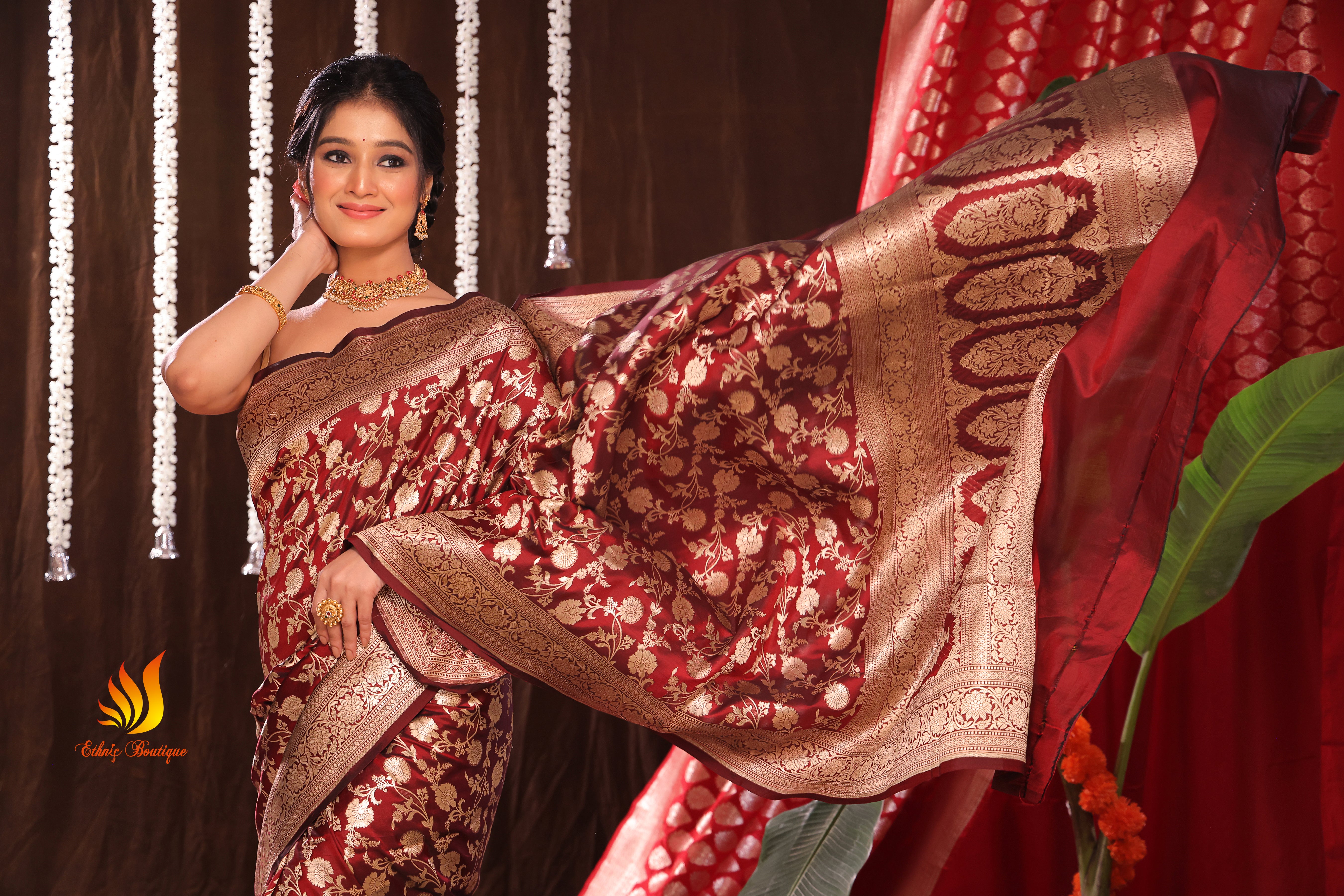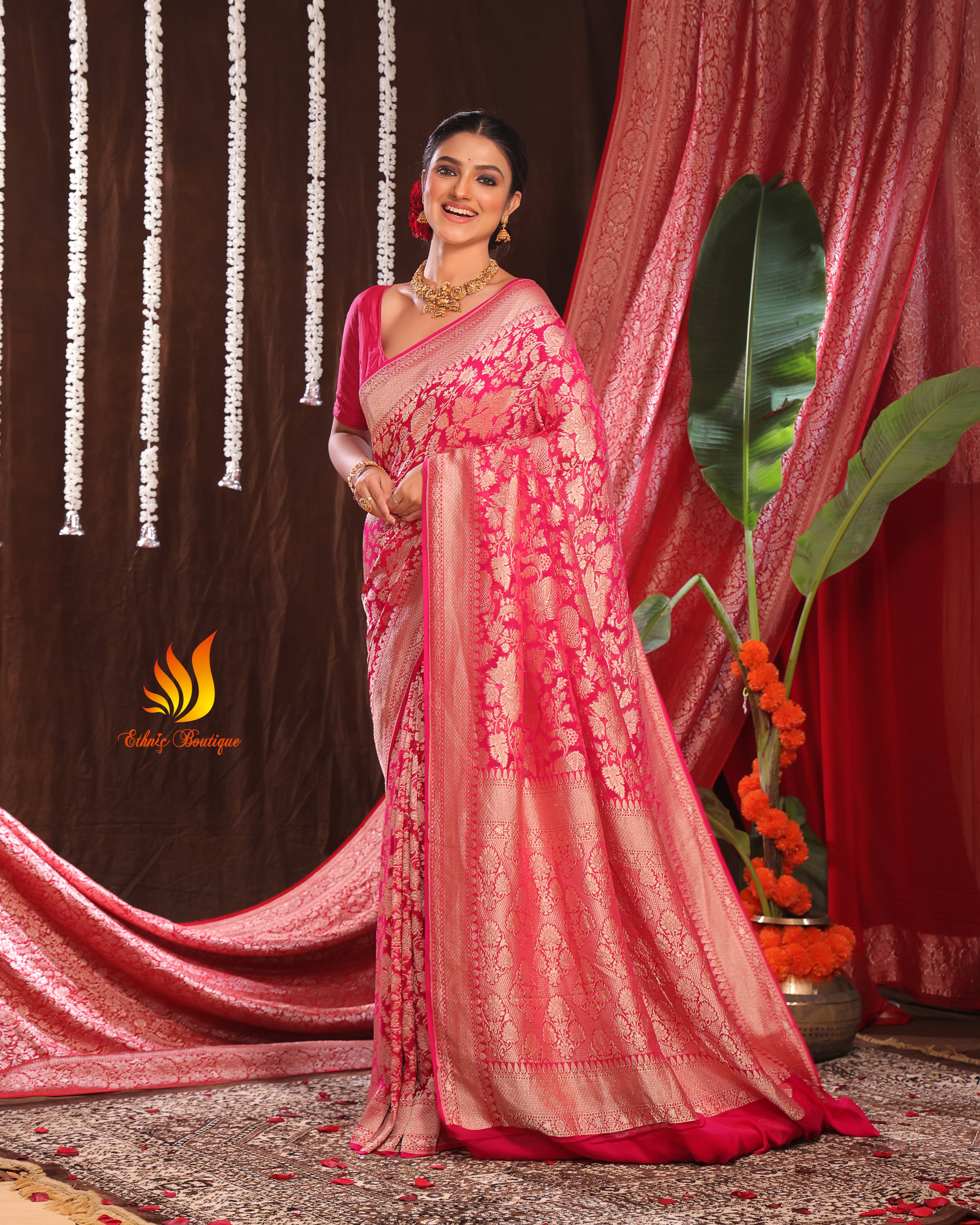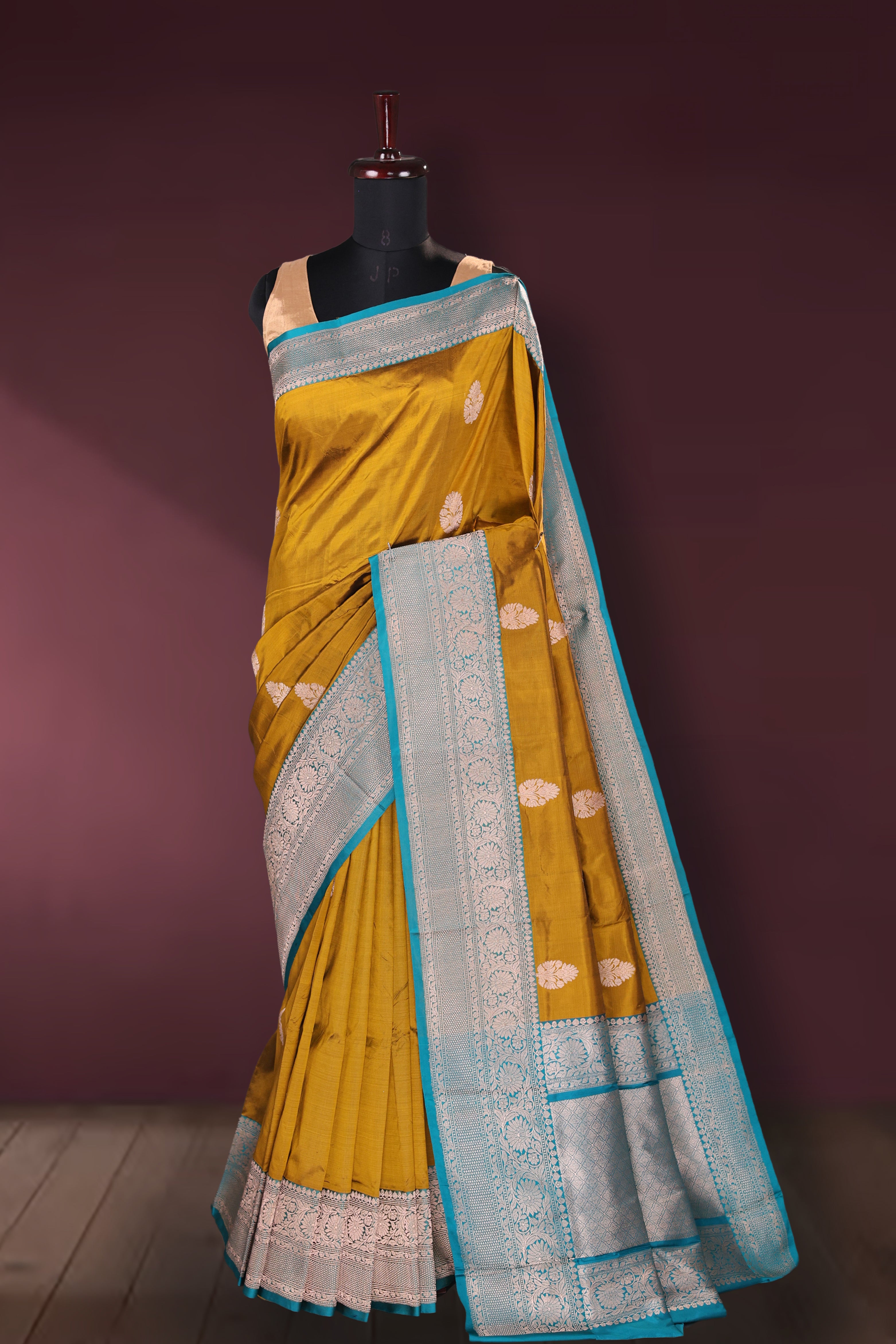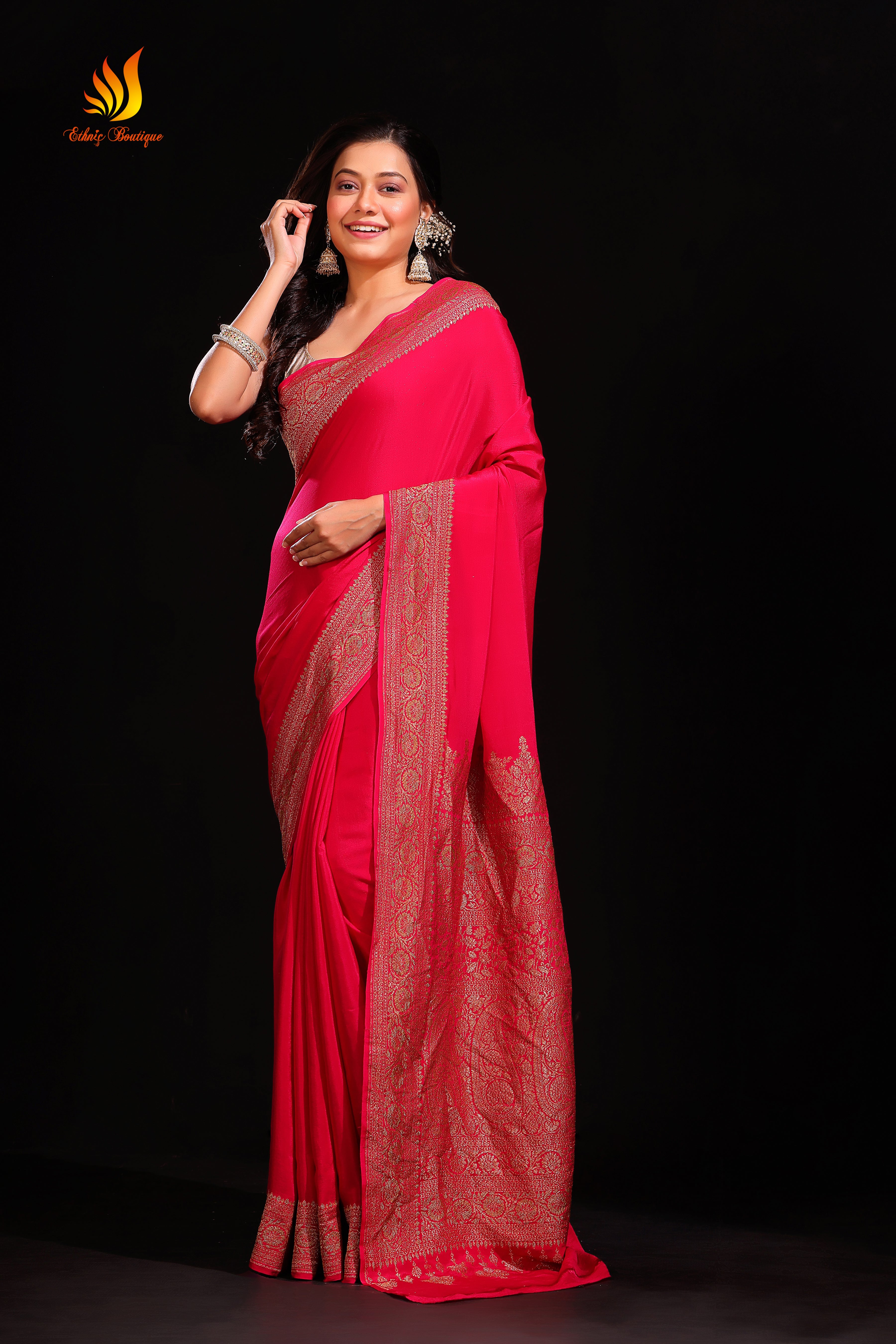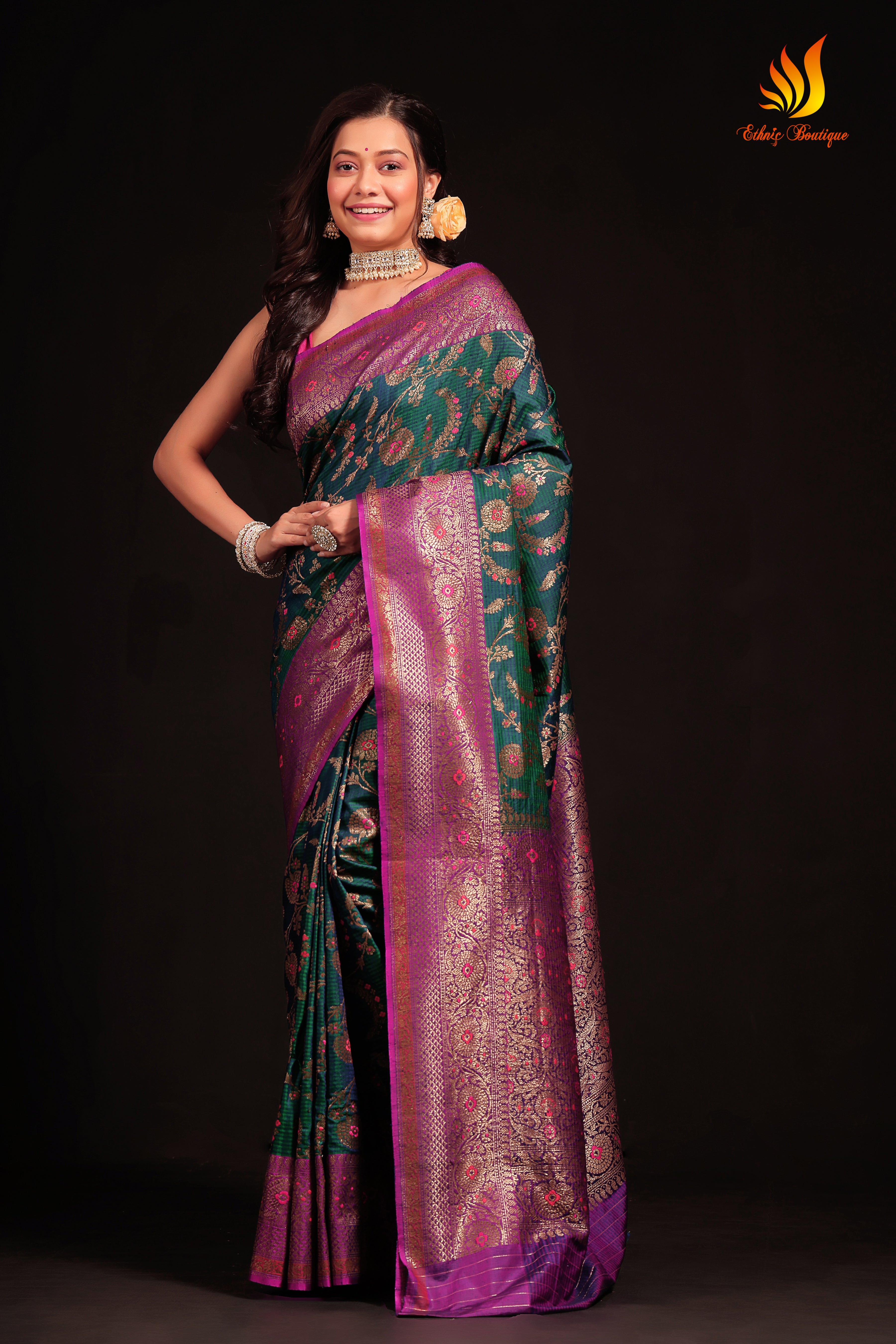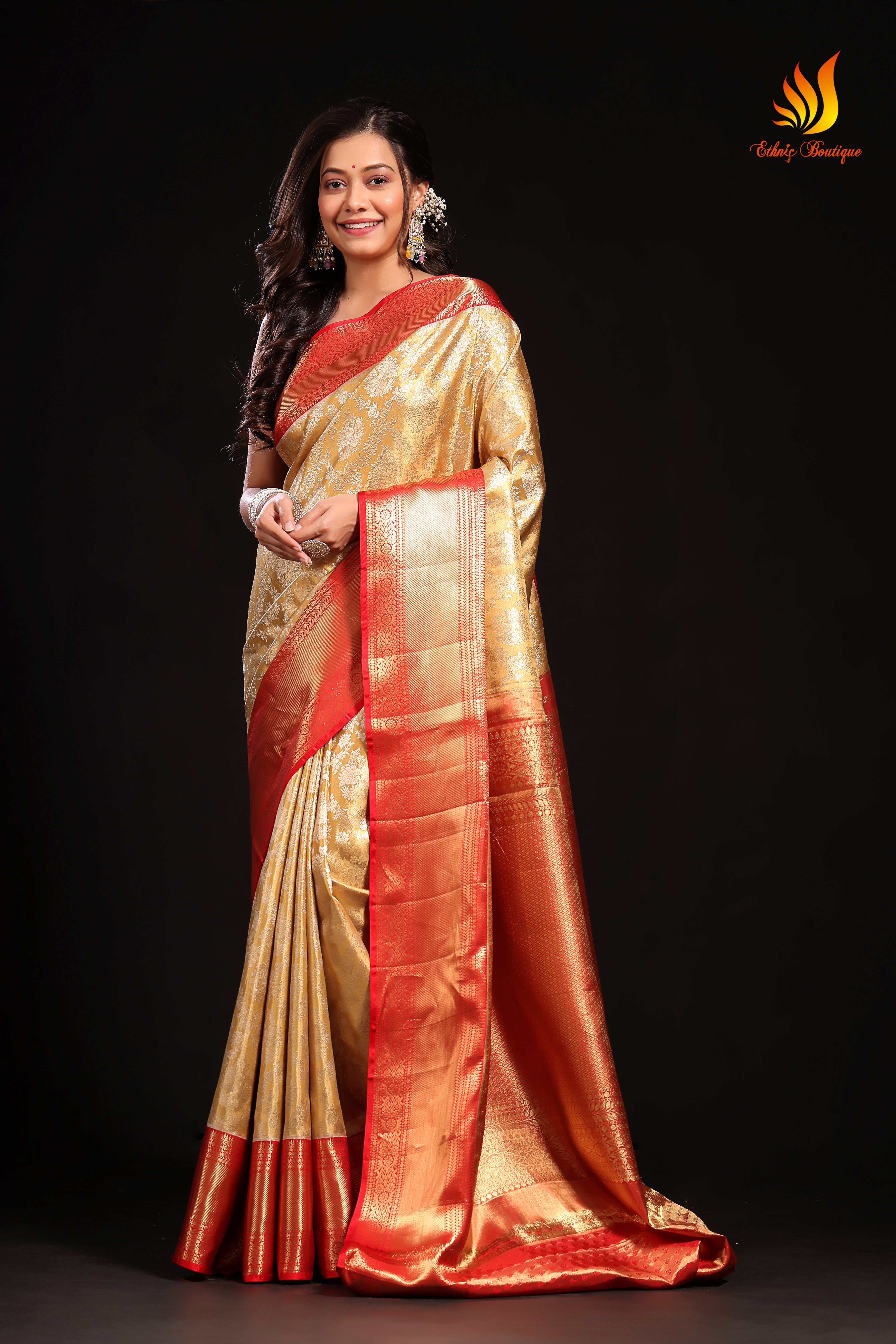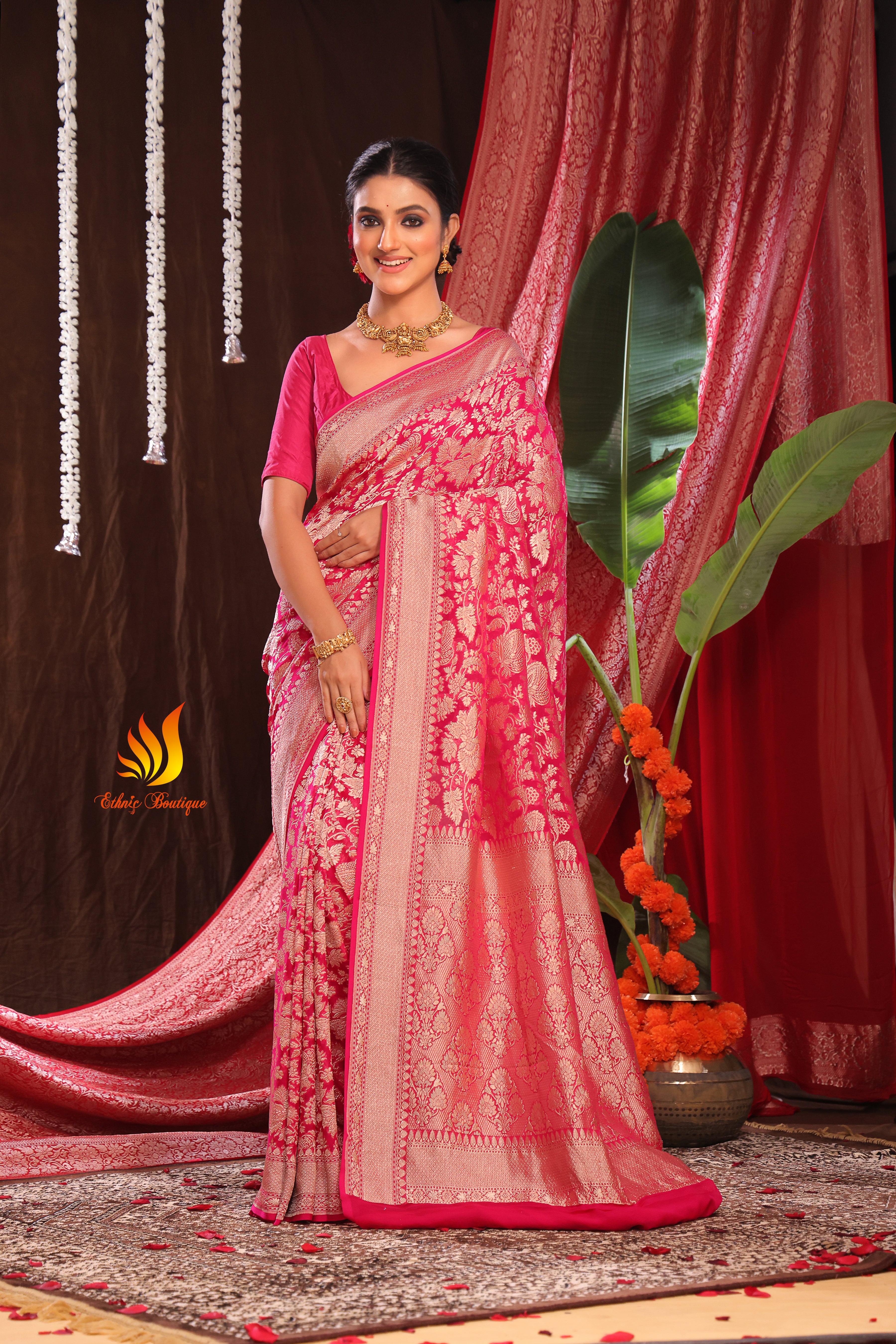A Tissue Kanjivaram saree is a blend of traditional craftsmanship with a lustrous, lightweight fabric known as tissue. The saree, originating from the Kanchipuram region in Tamil Nadu, is one of the finest types of sarees that reflects rich Indian heritage, grandeur, and elegance. Below is a detailed breakdown of what makes a Tissue Kanjivaram saree unique:
1. Fabric & Texture
-
Tissue Silk: The defining feature of a Tissue Kanjivaram saree is the fabric itself. Tissue silk is a delicate yet elegant material woven with fine silk threads and enhanced with a metallic sheen, often created using gold or silver zari. This gives the saree a shiny, almost translucent look that makes it stand out.
-
Lightweight: Compared to traditional heavy Kanjivaram silks, tissue silk is lighter in weight. It drapes gracefully without compromising on the elegance and richness that Kanjivaram sarees are known for.
2. Design & Patterns
-
Classic Kanjivaram Motifs: Like all Kanjivaram sarees, Tissue Kanjivaram sarees feature intricate designs. Common motifs include peacocks, paisleys, elephants, lotus flowers, and traditional geometric patterns. These motifs are woven with gold or silver zari to enhance their beauty.
-
Brocade & Zari Work: The saree typically has rich brocade work, where zari threads (usually gold or silver) are woven into the fabric to create beautiful raised patterns. The richness of the zari complements the lightness of the tissue silk.
-
Borders & Pallu: The borders are usually broad and decorated with intricate zari motifs, often contrasting in color with the body of the saree. The pallu (the end piece) is highly ornamented with elaborate zari designs, creating a regal look.
-
Color Palette: Tissue Kanjivaram sarees come in vibrant and rich colors like deep red, royal blue, gold, maroon, green, and purple. The borders and pallu often have contrasting colors to make the designs pop.
3. Weaving Technique
-
Handwoven Tradition: Tissue Kanjivaram sarees are handwoven on traditional looms by skilled artisans from the Kanchipuram region. The weaving process is meticulous and takes time, ensuring that each saree is crafted to perfection.
-
Zari Weaving: The zari threads used in Tissue Kanjivaram sarees are typically made from gold or silver, adding a luxurious touch. The intricate design patterns are woven with these metallic threads, which gives the saree its richness and shine.
-
Softness and Sheen: The tissue fabric used in these sarees is woven to maintain a soft and smooth texture while also giving it the characteristic shimmer that is associated with tissue silk.
4. Occasions to Wear
-
Weddings: Tissue Kanjivaram sarees are a popular choice for brides, especially in South India. The saree’s lightweight yet regal appearance makes it ideal for the occasion, as it exudes elegance and luxury.
-
Festivals: These sarees are perfect for grand festivals like Diwali, Navratri, Pongal, and Onam, where one wants to wear something beautiful and traditional yet comfortable.
-
Special Occasions: Whether it’s a reception, a family gathering, or any other celebratory event, Tissue Kanjivaram sarees are ideal to showcase traditional beauty and charm.
5. Draping
-
Comfortable Drape: Unlike heavier silks, Tissue Kanjivaram sarees are lighter, which makes them easier to drape. The fabric flows smoothly, creating an elegant and graceful silhouette.
-
Graceful Fall: The tissue fabric, while light, has a beautiful flow and structure when worn, allowing the saree to hold its shape and highlight the intricate zari designs.
6. Price Range
-
Luxury Item: Tissue Kanjivaram sarees are on the expensive side due to the fine silk, intricate zari work, and the handloom weaving process. The prices can vary depending on factors like the quality of the silk, the type of zari (gold vs. silver), and the complexity of the design.
-
Investment Piece: While these sarees may be costly, they are often seen as an investment in timeless, high-quality fashion, and many people choose to pass them down through generations.
7. Care & Maintenance
-
Dry Clean Only: Like all silk sarees, Tissue Kanjivaram sarees require delicate care. They should only be dry cleaned to maintain their fabric, sheen, and zari work.
-
Storage: Store the saree in a cool, dry place, away from direct sunlight to prevent fading. It’s recommended to keep it in a cloth bag or box to avoid direct contact with dust or moisture, which can tarnish the zari.
8. Cultural Significance
-
Symbol of Tradition: Kanjivaram sarees have a deep cultural significance in South India, especially in Tamil Nadu, where they are considered a symbol of luxury and tradition. Tissue Kanjivaram sarees uphold this legacy by combining classic artistry with a lighter, more wearable fabric.
-
Bridal Tradition: The saree is particularly revered for weddings and other significant rituals. The fine craftsmanship, elegant design, and luxurious feel of the saree make it a cherished item in many families.
9. Where to Buy
-
Kanchipuram Stores: The best place to buy authentic Tissue Kanjivaram sarees is from stores in the Kanchipuram region, where these sarees are woven by artisans.
-
Reputed Boutiques and Online Stores: Many reputed saree boutiques in cities like Chennai, Bangalore, and Hyderabad, as well as online stores, offer a wide range of Tissue Kanjivaram sarees.
10. Types of Tissue Kanjivaram Sarees
-
Gold Zari Tissue: Some Tissue Kanjivaram sarees feature pure gold zari, which is considered the most luxurious and prestigious form of zari.
-
Silver Zari Tissue: For a more understated but still opulent look, silver zari can be used to create a softer, more delicate shine.
-
Mixed Zari Tissue: Some sarees blend gold and silver zari, creating a multi-dimensional effect that enhances the intricate patterns.
11. Why Choose Tissue Kanjivaram Saree?
-
Lightweight & Comfortable: Unlike traditional Kanjivaram silks, tissue sarees are lighter, making them a better option for women who want to wear Kanjivaram on a longer occasion, without the heaviness.
-
Elegance & Grace: Tissue Kanjivaram sarees combine timeless elegance with contemporary comfort, making them the ideal choice for formal occasions where both beauty and ease are important.
-
Durability: The fine craftsmanship ensures that these sarees remain durable and can last for generations when cared for properly.
A Tissue Kanjivaram saree combines all the finest elements of Indian tradition—luxurious silk, intricate zari work, and elegant design—into a beautiful, wearable masterpiece. Whether for weddings, festivals, or formal occasions, it’s a perfect choice for those looking for both comfort and grandeur.
Would you like suggestions on how to pick the right color and style for an event or find stores that offer Tissue Kanjivaram sarees?
